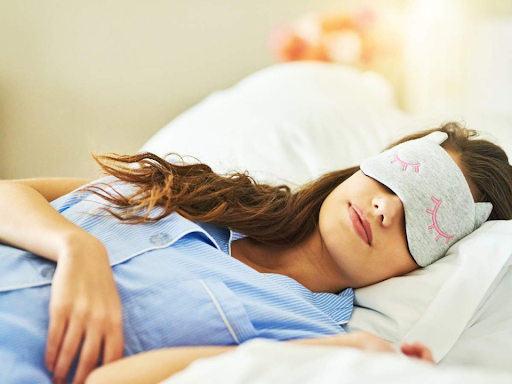Establishing healthy sleeping habits for wellness and vitality are essential. In this article we explore the crucial links eetween sleep, physical health, mental clarity, and emotional well-being. Besides, it we will also discuss practical steps how you can enhance your sleep quality and foster optimal health.
I. Introduction
A. Importance of Healthy Sleep Habits
Healthy sleep habits are fundamental to our overall well-being, impacting every aspect of our lives from physical health to mental clarity and emotional stability. Sleep is not merely a passive state but an active process essential for the body and mind to rejuvenate and repair. Adequate sleep supports immune function, hormone regulation, and cellular repair processes crucial for maintaining optimal physical health. Research consistently links insufficient sleep with increased risks of chronic conditions such as cardiovascular diseases, diabetes, obesity, and compromised immune function. Therefore, prioritizing healthy sleep habits is paramount for disease prevention and longevity.
Moreover, sleep plays a pivotal role in mental clarity and cognitive function. It enhances memory consolidation, learning, and problem-solving abilities. A well-rested brain is more adept at processing information, making decisions, and maintaining focus throughout the day. In contrast, inadequate sleep can lead to cognitive impairment, decreased productivity, and difficulty managing daily tasks. Emotionally, sufficient sleep promotes mood stability and resilience to stress. It fosters emotional regulation and reduces the likelihood of mood disorders such as anxiety and depression. Recognizing the importance of healthy sleep habits lays the foundation for a balanced and productive life.
II. Understanding Sleep’s Impact
A. Physical Health
The physical health benefits of sleep are profound and multifaceted. During sleep, the body undergoes essential processes that support overall health and vitality. This includes tissue repair, muscle growth, and the release of hormones that regulate appetite and metabolism. Sleep deficiency disrupts these processes, leading to systemic inflammation, impaired glucose metabolism, and an increased risk of chronic diseases. Studies have shown that individuals who consistently get an adequate amount of sleep have lower incidences of obesity, diabetes, cardiovascular disease, and other metabolic disorders.
Furthermore, sleep is crucial for immune function. It strengthens the immune system by enhancing the production of cytokines, proteins that target infection and inflammation. Chronic sleep deprivation compromises immune response, making individuals more susceptible to infections and illnesses. Therefore, prioritizing sufficient sleep as part of a healthy lifestyle is essential for maintaining robust physical health and resilience against diseases.
B. Mental Clarity
Sleep is vital for cognitive function and mental clarity. It supports various cognitive processes, including memory consolidation and information processing. During sleep, the brain consolidates memories and integrates new information, enhancing learning and problem-solving abilities. Adequate sleep also promotes creativity and innovation by allowing the brain to make connections and synthesize ideas effectively.
Conversely, sleep deprivation impairs cognitive performance across multiple domains. It leads to deficits in attention, concentration, and decision-making. Chronic sleep deficiency is associated with cognitive decline and an increased risk of neurodegenerative diseases such as Alzheimer’s disease. Therefore, prioritizing good sleep hygiene and maintaining regular sleep patterns are crucial for preserving cognitive function and optimizing mental clarity throughout life.
C. Emotional Well-being
Sleep plays a pivotal role in emotional regulation and mental health. A restful night’s sleep promotes emotional resilience, allowing individuals to manage stress effectively and maintain stable moods. Sleep deprivation, on the other hand, increases vulnerability to emotional disturbances such as irritability, mood swings, and heightened stress responses. Chronic sleep deficiency is linked to an increased risk of mood disorders, including depression and anxiety.
Moreover, the relationship between sleep and emotional well-being is bidirectional. Emotional stress and psychological disorders can disrupt sleep patterns, leading to a vicious cycle of sleep disturbance and worsened emotional health. Establishing healthy sleep habits, such as maintaining a consistent sleep schedule and creating a conducive sleep environment, is crucial for promoting emotional stability and overall psychological well-being.
III. Strategies for Better Sleep
A. Establishing a Routine
Creating a consistent sleep routine helps synchronize the body’s internal clock, known as the circadian rhythm, which regulates the sleep-wake cycle. Going to bed and waking up at the same time every day helps reinforce this natural rhythm, making it easier to fall asleep and wake up feeling refreshed. Incorporating relaxing bedtime rituals, such as reading a book or taking a warm bath, signals to the body that it is time to wind down and prepare for sleep.
Consistency is key in establishing a sleep routine. This includes maintaining consistent sleep and wake times even on weekends and holidays. Irregular sleep patterns can disrupt the circadian rhythm, leading to difficulties falling asleep and poor sleep quality overall. By prioritizing a regular sleep schedule and bedtime routine, individuals can optimize their sleep quality and promote better overall health.
B. Optimizing Sleep Environment
Creating a sleep-conducive environment is essential for promoting restful sleep. Factors such as room temperature, lighting, noise levels, and comfort of bedding can significantly impact sleep quality. Ideally, the bedroom should be cool, quiet, and dark to facilitate uninterrupted sleep. Investing in a comfortable mattress and pillows that provide adequate support can also enhance comfort and reduce the likelihood of sleep disturbances.
Minimizing exposure to disruptive stimuli before bedtime is equally important. This includes limiting screen time from electronic devices such as smartphones, tablets, and computers, as the blue light emitted from these devices can interfere with the production of melatonin, a hormone that regulates sleep. Establishing a relaxing bedtime routine, such as practicing relaxation techniques or gentle stretching exercises, can further signal to the body that it is time to unwind and prepare for sleep.
C. Use of Sleep Aids
In certain situations, sleep aids can play a beneficial role in enhancing sleep quality and promoting overall well-being. Over-the-counter supplements like melatonin are natural options that can help regulate the sleep-wake cycle and facilitate sleep onset. Melatonin supplements are particularly useful for individuals who struggle with irregular sleep patterns or jet lag, as they can help reset the body’s internal clock.
It’s important to explore different natural sleep aids to find the one that works best for you. Whether it’s herbal supplements, relaxation techniques, or lifestyle adjustments, incorporating these aids into your bedtime routine can contribute to a more restful and satisfying sleep experience. You can visit this site for more information and personalized recommendations.
IV. Factors Influencing Sleep Quality
A. External Environment
External factors in the sleep environment can significantly impact sleep quality. This includes ambient noise levels, temperature fluctuations, and exposure to light sources. Creating a quiet and dark sleep environment can help minimize disruptions and promote restful sleep. Using earplugs, white noise machines, or blackout curtains can be effective strategies for reducing external stimuli that may interfere with sleep.
Temperature regulation is also critical for optimal sleep quality. The ideal room temperature for sleep is generally cool, around 60-67 degrees Fahrenheit (15-19 degrees Celsius). This temperature range promotes comfort and relaxation, facilitating the body’s natural thermoregulation processes during sleep. Additionally, ensuring adequate ventilation and airflow in the bedroom can further contribute to a comfortable sleep environment.
Light exposure, particularly blue light emitted from electronic devices, can suppress the production of melatonin and interfere with the circadian rhythm. It is advisable to limit exposure to screens at least an hour before bedtime and consider using devices with nighttime settings that reduce blue light emission. Creating a sleep-friendly environment by minimizing external stimuli and optimizing ambient conditions can significantly improve sleep quality and overall well-being.
B. Internal Factors
Internal factors such as stress levels, medical conditions, and individual sleep preferences can also influence sleep quality. Chronic stress and anxiety can disrupt sleep patterns and contribute to insomnia. Practicing stress management techniques, such as meditation, deep breathing exercises, or progressive muscle relaxation, can help alleviate tension and promote relaxation before bedtime.
Medical conditions such as sleep apnea, restless leg syndrome, and chronic pain can also impact sleep quality. It is essential to address underlying medical issues with the guidance of a healthcare professional to optimize treatment and improve sleep outcomes. Additionally, individual sleep preferences, such as sleep position or mattress firmness, can affect comfort and sleep quality. Finding personalized solutions that address specific internal factors contributing to sleep disturbances is key to enhancing overall sleep quality.
C. Technology’s Role
The pervasive use of technology, particularly electronic devices with screens, has become increasingly integrated into daily life. However, excessive screen time, especially close to bedtime, can negatively impact sleep quality. The blue light emitted from screens suppresses melatonin production, delaying sleep onset and reducing overall sleep duration. It is recommended to establish a digital curfew by avoiding screens at least an hour before bedtime and creating a relaxing bedtime routine that promotes sleep readiness.
Moreover, the use of technology in the bedroom, such as watching television or using electronic devices in bed, can disrupt sleep patterns and interfere with the sleep environment. Establishing boundaries around technology use in the bedroom and creating a sleep-conducive environment free from electronic distractions can promote better sleep hygiene. By recognizing the impact of technology on sleep quality and implementing strategies to minimize its disruptive effects, individuals can optimize their sleep environment and improve overall sleep health.
V. Lifestyle and Sleep
A. Nutrition’s Impact
Nutrition plays a crucial role in sleep quality and overall health. Dietary choices and eating patterns can influence sleep-wake cycles, energy levels, and metabolism. Consuming a balanced diet that includes a variety of nutrients, such as complex carbohydrates, proteins, healthy fats, vitamins, and minerals, supports overall well-being and promotes restful sleep.
Timing of meals can also affect sleep patterns. Consuming large or heavy meals close to bedtime can cause discomfort and disrupt sleep. It is recommended to have a light dinner several hours before bedtime and avoid consuming caffeine or stimulants in the evening. Additionally, staying hydrated throughout the day can promote overall health and help regulate sleep-wake cycles.
Certain foods and beverages contain compounds that can affect sleep quality. For example, foods rich in tryptophan, such as dairy products, nuts, seeds, and poultry, can promote relaxation and support the production of serotonin and melatonin, hormones that regulate sleep. Incorporating these foods into a balanced diet may help improve sleep quality naturally.
B. Exercise Benefits (continued)
Engaging in regular physical activity has been shown to promote deeper and more restorative sleep. Aerobic exercise, such as walking, running, swimming, or cycling, helps regulate the sleep-wake cycle by increasing the duration of deep sleep stages, known as slow-wave sleep. Deep sleep is essential for physical recovery, muscle repair, and immune function.
Moreover, exercise can help reduce symptoms of insomnia and other sleep disorders. Studies indicate that individuals who participate in regular exercise experience fewer sleep disturbances and shorter sleep onset latency compared to sedentary individuals. The timing of exercise also plays a role in its impact on sleep, exercising earlier in the day has been shown to have a more positive effect on sleep quality than late-night workouts, which can be stimulating.
In addition to improving sleep quality, regular physical activity contributes to overall health and well-being. It helps manage weight, reduce stress, and improve cardiovascular health, all of which indirectly support better sleep outcomes. Incorporating consistent exercise into daily routines, even in moderate amounts, can have significant benefits for sleep and overall health.
C. Stress Management
Effective stress management is crucial for promoting restful sleep and overall well-being. Chronic stress and anxiety can contribute to sleep disturbances, such as difficulty falling asleep or staying asleep. Stress activates the body’s fight or flight response, releasing hormones like cortisol and adrenaline that can interfere with sleep patterns.
Practicing relaxation techniques and stress reduction strategies can help calm the mind and prepare the body for sleep. Techniques such as deep breathing exercises, progressive muscle relaxation, yoga, and mindfulness meditation promote relaxation and reduce physiological arousal. These practices help lower heart rate, blood pressure, and cortisol levels, creating a conducive environment for falling asleep and staying asleep.
Incorporating stress management techniques into a daily routine can have cumulative benefits for sleep quality and overall health. Establishing a bedtime ritual that includes relaxation exercises or soothing activities, such as reading or taking a warm bath, signals to the body that it is time to unwind and prepare for sleep. Consistent practice of stress management techniques helps build resilience to daily stressors and supports healthy sleep habits in the long term.
VI. Conclusion
Prioritizing healthy sleep habits is essential for overall health, well-being, and quality of life. Understanding the impact of sleep on physical health, mental clarity, and emotional well-being underscores the importance of adopting strategies that promote restful sleep. By establishing a consistent sleep routine, optimizing the sleep environment, and addressing factors that influence sleep quality, individuals can enhance their sleep hygiene and improve overall sleep outcomes.
Factors such as external environment, internal factors like stress and medical conditions, and the role of technology in sleep disturbance highlight the complexity of sleep health. Incorporating lifestyle practices such as nutrition, regular exercise, and stress management into daily routines supports healthy sleep patterns and contributes to overall health.
Recognizing the significance of sleep as a pillar of wellness empowers individuals to make informed choices that prioritize rest and rejuvenation. By investing in healthy sleep habits and implementing evidence-based strategies, individuals can optimize their sleep quality, enhance daytime functioning, and promote long-term health. Embracing a holistic approach to sleep health fosters resilience, vitality, and a balanced lifestyle that supports overall well-being.



